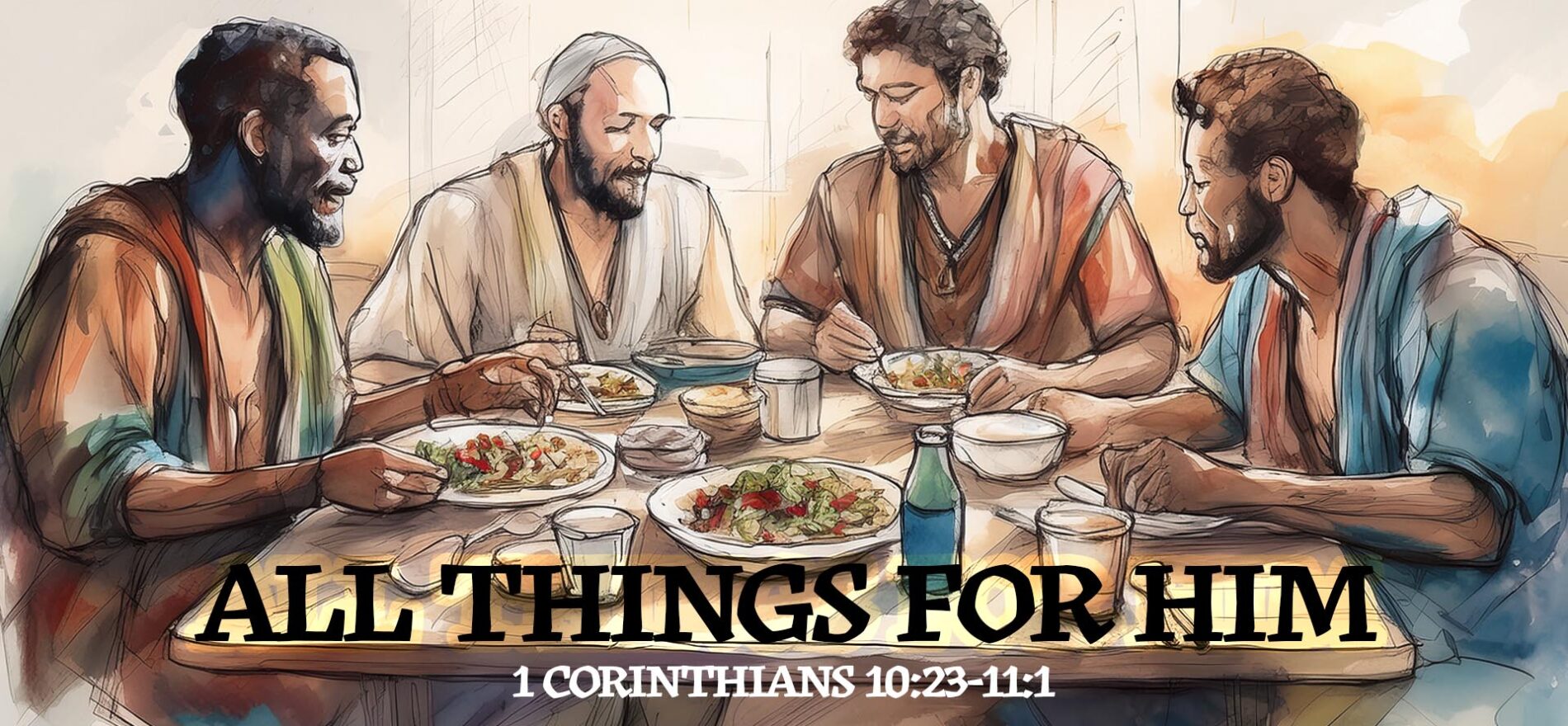[Transcript]
With all of his major points made, in these closing verses of chapter ten, Paul summarizes what he had been trying to say since the beginning of chapter eight. However, even in this summary, there are some truths that may be difficult for some to accept. As we look at them, be sure to examine your heart toward others with whom you disagree on matters of Christian liberty.
“Let no one seek his own good, but the good of his neighbor.” – 1 Corinthians 10:24
Paul brought up that quote again: “All things are lawful,” but not all things are helpful (10:23). He mentioned it earlier (6:12) in his teaching against sexual immorality. He brought it up once more here regarding our liberties. The Kingdom way is to prioritize the good of others over our own. However, Paul doesn’t give an inch regarding the mature understanding that all meats are permissible for Christians to eat.
“Eat everything that is sold in the meat market, ⌊asking no questions⌋ for the sake of the conscience, 26 for ‘the earth is the Lord’s, and its fullness.’” – 1 Corinthians 10:25-26 (LEB)
Nor does he relent on the truth that the mature should bear with the weak in a loving way by refraining from eating the meats in question.
“But if someone says to you, ‘This is offered to idols,’ do not eat it, for the sake of that one who informed you and the conscience.” – 1 Corinthians 10:28 (LEB)
Here is one of the more challenging aspects of Christian life. We observe this issue in various ways within the Western Evangelical church. A simple example is alcohol. On one side, there are the “teetotalers” who abstain from all alcoholic beverages, and on the other, believers who permit alcohol as long as there is no drunkenness. Those who allow alcohol are like the meat-eaters in Corinth. They recognize that there’s no sin in having a drink if they do so responsibly and avoid the harmful effects of alcohol. The teetotalers are like those who eat only vegetables because they see alcohol as linked to sinful excess and drunkenness, or because of a personal history with alcoholism.
I grew up under the influence of teetotalers. I was raised that beer is the devil’s drink. So I came up in the faith believing that alcoholic drinks were sinful and that people who drank, even without drunkenness, were in sin. And to be fair, all of the anecdotal evidence in the people around me supported this belief. Everyone that I knew who drank, also cussed, was sexually active outside of marriage, was partying, and was not actively pursuing the Lord. But as I became an adult and moved away from the Bible Belt to the plains of northeast Colorado, I began to see things differently. I met believers who loved the Lord, pursued Him faithfully, and also had beer in their refrigerator. At the time, that was a ground-shaking event in my faith. I gradually made room for this in my life. The judgments ceased, and I’ve had a more nuanced understanding for the last twenty+ years of my walk with Christ.
The main point Paul emphasizes is to respond with love. If you feel at liberty to eat or drink, do so, but not at the expense of a brother’s conscience. And if you don’t feel free to eat or drink, when you discover that your brother does, don’t judge him. However, it’s clear that in these situations, it’s the liberated brother who feels the most “loss” because he is the one denying himself. That’s why Paul included an important nuance in his argument.
“I do not mean your conscience, but his. For why should my liberty be determined by someone else’s conscience? If I partake with thankfulness, why am I denounced because of that for which I give thanks?” – 1 Corinthians 10:29-30
Just because you’re the one giving up your rights doesn’t mean you’re wrong. You don’t have to change your beliefs about food and drink just because a weaker believer questions your understanding. If you are eating and drinking with gratitude to the Lord, there is no condemnation for your participation. However, the way of love requires us to change our behavior for their benefit.
“So, whether you eat or drink, or whatever you do, do all to the glory of God.” – 1 Corinthians 10:31
This verse holds significant power. It provides a way to determine if an activity is worth the effort. First, Paul exploded the application of his point to “whatever you do.” That indicates that the principle he’s been promoting has broad, life-wide application. Whether the liberty in question is about food, drink, holidays, work, hobbies, entertainment, you name it, this principle applies.
If it cannot be done in a way that glorifies the Lord, don’t do it.
Clearly, if there are written commandments against something, it is impossible to do it in a way that glorifies the Lord. It will always be sinful. However, the focus of the last three chapters has not been on clear commandments but on matters of conscience. And in these, the only command we are given is to respond in love to our brother. But when we expand this principle to all matters of conscience and liberty, it brings everything into a new light.
Can you eat and drink with liberty and also glorify the Lord? Can you take part in civic activities and also glorify the Lord? Can you play travel sports and glorify the Lord through them? Can you glorify the Lord as you attend a concert or a movie? These are all matters of personal conscience that we must address. In Romans 14, Paul taught, concerning the same principles, that we must be fully convinced in our minds because whatever doesn’t proceed from faith is sin.
Just to finish the story, I made a personal decision to refrain from social drinking for a few reasons. First, as a minister, it would definitely be offensive to those who have a different conscience on the matter. You will never find me purchasing alcoholic beverages in stores or restaurants for this reason. However, I have been offered a beer in the privacy of friends’ homes, where there was no opportunity for an offense, and in those cases, I have the liberty to accept. I can tell you with 100% assurance that if I did accept, there would be no condemnation for that before the Lord. But as a rule, I won’t risk it for the sake of others with a different conscience than mine. That is the way of love.
I hope you’re not offended by this, but it is in the spirit of precisely what Paul taught, and is a VERY relevant topic that needs to be discussed Biblically.
“Be imitators of me, as I am of Christ.” – 1 Corinthians 11:1
First, congratulations to modern Bible translators for making a chapter break one verse too early. Though this verse is the first verse of chapter eleven, it is believed to be the closing statement of Paul’s teachings in chapter ten. And though his call for the Corinthians to imitate him as He follows Christ can apply to the contents of the whole letter, it makes the best sense to be the bookend of his teachings on Christian liberty and conscience.
After saying to do all for the glory of God, he turned to what that looks like. Give no offense to anyone, whether Greek or Jew or the church. Paul said he tries to please everyone by not seeking his own advantage. He’s not a people pleaser in the sense that he’s overly concerned about how others perceive him or how they feel about what he says. Instead, he puts their needs ahead of his own, making sure there are no grounds for them to accuse him of selfishness or self-interest. This is what Paul hopes we will imitate. We should not allow anyone to accuse us or defame the Lord’s name because of our actions toward others or in how they perceive our treatment of them. To paraphrase Pastor Matt Chandler, if you have neighbors who don’t believe in the Lord and are hostile toward Him, they should still see you as the best neighbor they’ve ever had. Share the truth and love them well.
I’ve often taught that the behavior of Christians is what makes atheists, not necessarily their beliefs. I mean, Gandhi was quoted as saying, “I like your Christ. I do not like your Christians. Your Christians are so unlike your Christ.” He’s not wrong. I would simply respond to him that you should judge our faith by Christ and not His followers – which is the correct response – but you also cannot get around the fact that the behavior of those who claim to follow Christ drives people away. Which is why Peter, Paul, John, James, and all the NT authors are clamoring for Christ’s people to be holy as He is holy. We are His people, the sheep of His pasture, and we should increasingly look like our Father. And this is where Gandhi got it wrong. Becoming like Christ is a life-long process. To catch any given believer at any point in their journey would give you an imperfect reflection of Jesus. We’re not JUST like our Christ…. Yet.
However in the meantime until we are just like Him, the way we make up for those shortcomings is confession and repentance. I can’t think of any other way to say it. We are most Christlike when we humble ourselves. So even if you aren’t the picture perfect representation of Christ to your neighbor, the way you preserve your testimony of Christ with them is to walk humbly, confess, and repent when you’ve fallen short… not only to Christ, but to your neighbor.
“If one of the unbelievers invites you to dinner and you are disposed to go, eat whatever is set before you without raising any question on the ground of conscience.” – 1 Corinthians 10:27
This verse presents a challenge. If you’ve ever been on a foreign mission trip, you were probably advised to eat whatever your hosts prepare. This verse is commonly the source of that advice (though it is being misapplied). Clearly, if you have allergies or a condition that restricts your diet, you should not eat anything that could hurt you. However, many people do not have these issues and are simply faced with eating something they might not like.
But, in this context, this wasn’t about meals with foreigners in a foreign land. This was about the unbelieving people who live nearby. If you had a Muslim neighbor who invited you over for a barbecue, and you discovered that he was cooking with halal meat, this is the scenario that Paul had in mind. Eat whatever is put before you, with no objections over conscience, because the Kingdom work to accomplish is greater than your conscience’s objections.
However, verse twenty-eight states that if you bring a believing friend to the barbecue who objects because it violates his conscience, and you cannot reason with him, then you should decline for his sake. So, you see, this isn’t a clear-cut, one-size-fits-all situation.
These aren’t always straightforward answers. You need to ask yourself whether your conscience about food or drink outweighs the opportunity to share the Gospel. Additionally, if other believers are present, you must also consider whether their consciences could be offended if you participate. In many ways, this complexity works against our desire for simplicity. And it becomes yet another way to crucify the flesh in every situation.
Paul’s closing thoughts on Christian rights and liberty end with a very helpful metric. Whatever you do, do it to the glory of God. If you can’t glorify God in an activity, it’s fair to ask whether a believer should participate in that activity. If exercising your liberty destroys your brother’s faith, that doesn’t glorify the Lord. Ultimately, our actions should cause no offense to anyone, inside or outside the church. It’s our responsibility to find a balance between honoring the Lord, avoiding offense, and staying true to our beliefs. Here’s what you should take away from this passage.
- We should seek the good of others before our own (10:24).
- No food is offensive to the Lord (10:25-26).
- If food is offensive to a brother, abstain (10:28).
- Their conscience does not inform your liberty, but it does inform your conduct (10:29-30).
- In all things, glorify the Lord (10:31).
- As they follow Christ, imitate the faith of faithful believers regarding these matters (11:1).







